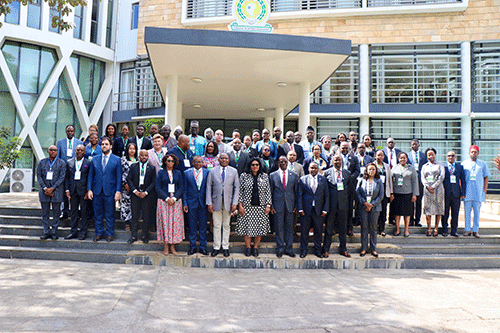George Sanzila
ARUSHA (Tanzania) – Following digitalisation gains made by many parliaments largely due to the Covid-19 pandemic, there is an emerging call for legislative bodies to embrace Artificial Intelligence (AI).
The appeal was made at the 8th Society of Clerk-At-The Table (SoCATT) Professional Development Seminar in Arusha, Tanzania. Officials of parliaments from the Commonwealth Parliamentary Association (CPA) Africa Region attended the two-day seminar held on 21 and 22 May 2024 under the theme ‘Re-positioning Parliamentary Administration in the era of Evidence and Modernisation’. The seminar was intended to share good practices and experiences on evidence use and modernisation in the parliamentary setting. Secretary of National Assembly Lydia Kandetu, who is also the deputy chairperson of SoCATT Africa region, noted when delivering remarks at the official opening that the seminar serves as a vehicle for capacity-building and a lesson-sharing approach of the society in the exchange of practical experiences on evidence-use and modernisation with emphasis on technological advancements, which are key priorities of the society’s strategic plan. One of the IT experts at the event, Luis Kimaid, executive director of Bussola Tech, noted that AI can be applied on core parliamentary functions such as legislative drafting, parliamentary reporting and editing, analysis of data and addressing other parliamentary functions such as the Hansard, citizens, participation and procedural advice and research. Some of the concerns raised during the seminar included data privacy and cyber security with the deputy director of ICT Operations at the National Assembly of Zambia David Mulenga imploring parliaments to develop frameworks on how to implement digital innovations to avoid such predicaments.
The Namibian legislature recently launched its e-parliament strategy, and has had to rapidly and stoically transform, despite the heavy cost burden that comes with such complex yet necessary and inescapable technologies with assistance from development partners, such as the Konrad Adenauer Stiftung and the Chinese and Turkish governments that have come on board to support the institution as it gravitates towards full ICT compliance.
The National Assembly conference centre was upgraded into a fully-fledged virtual centre with a video conferencing facility. The National Assembly chamber also received a fresh lease of life with the installation of a new digital technology system, replete with a touchscreen functionality that can give lawmakers access to a plethora of digital parliamentary documents such as the agenda (order paper), bills, the Constitution and standing rules and orders, among many others.
The system further enables the Speaker, as the presiding officer, to properly control debate in the House by deciding who should speak through a control unit. Members can also vote electronically, and may request other miscellaneous services.
The Namibian parliament further introduced the transmission of its meetings and sessions through live-streaming on social media platforms in its quest to strengthen participatory democracy. Professionalism and integrity also came under the spotlight at the gathering of administrative heads of parliaments and their subordinates, who all agreed that impartiality was sacrosanct in a parliament set-up and that it had the potential to improve trust, credibility and the ethos of democracy. Some of the challenges affecting professionalism in some parliaments include political interference.
Secretary to the Namibian National Council Tousy Namiseb, who also attended the meeting, stressed that efficiency could only be fully realised when parliament administration is strengthened and independent.
He noted that the absence of bodies such as the Parliamentary Service Commission can prevent parliament from fully executing its mandate of law-making, oversight and representation. He further said Namibia has made progress, and would soon table a Bill aimed at establishing a Parliamentary Service Commission.
*George Sanzila works for the National Assembly in the Division: Research, Information, Publications and Editorial services (RIPES).


